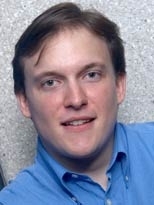Martin Zwierlein, assistant professor of physics, was recently awarded one of Germany's premier awards for young scientists.
The 100,000 euro Klung-Wilhelmy-Weberbank Prize for physics was presented to Zwierlein at a ceremony on Nov. 16 at the Free University of Berlin.
Zwierlein, 30, was honored for work he did in atomic physics as an MIT graduate student. Working with MIT physics professor Wolfgang Ketterle, Zwierlein discovered a new form of superfluidity in ultracold gases, in which pairs of atoms can flow without any friction.
The scientists observed superfluidity in a gas of lithium atoms, a million times colder than interstellar space and a million times thinner than air.
The substance serves as a valuable model system for superconductors and spurs hopes for a material that can transport current at room temperature without the usual energy loss. Indeed, scaled to the density of electrons in a metal, the new form of superfluidity would occur already far above room temperature.
"Germany loses at the moment more than 5 percent of its energy production through frictional losses in the transport of current--in the U.S.A. it is even about twice as much," calculates Zwierlein, a native of Bonn, Germany. "This lost energy would be sufficient to power entire countries. The exchange of normal wires with superconductors would thus allow enormous savings."
Ketterle, winner of the 2001 Nobel Prize for physics, delivered the laudatio (laudatory speech) at the award ceremony, describing the work that led to Zwierlein's prize.
The Klung-Wilhelmy-Weberbank Prize is annually awarded to a top young German scientist, alternating between a physicist and a chemist. Five of the previous awardees have since received the Nobel Prize: The physicists Theodor W. Hänsch, Gerd K. Binnig, Horst L. Störmer and Johann Georg Bednorz, and the chemist Hartmut Michel.
The prize is sponsored by the Otto-Klung Foundation at the Free University of Berlin, the Dr. Wilhelmy Foundation and the Society for the Promotion of Science of the Weberbank Actiengesellschaft.
A version of this article appeared in MIT Tech Talk on December 5, 2007 (download PDF).






